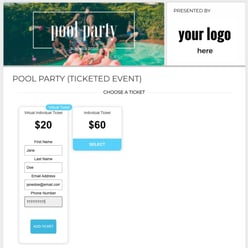When I was getting married, I learned that the invitation and RSVP process would tell our guests what to expect from the event. Raised ink, the time of day, the weight of the paper, hand-addressed vs printed addresses were the combination of clues to inform guests of expectations about the formality of the event.
While those days are behind us, the way we invite donors to an event matters.
Are you selecting an event ticketing system for yourself or your donors?
Here are a few features that nonprofits choose for themselves that are not good for donors.
- Ticketing fees: When you pay a fee to purchase a ticket, it says to the guest, “we are not investing in this experience” or “this is an entertainment event - not a fundraiser”
- Creating a login: It is inconvenient to create or reset a login for a website before purchasing a ticket or making a donation. While it would certainly support and mitigate data updates in a CRM, the process will impact sales and fundraising.
- Future Emails from the ticketing company: Will the ticketing system market other events to your guests, donors and board members?
- A form from the CRM/Donor Database system that does not actually issue a ticket and poorly captures the names of all guests. This always leads to questions from guests (do we need a ticket at the door?).
What happens when the ticketing process is a negative experience?
Unfortunately, it can be difficult to clearly see the impact of a poor ticketing system on your event unless you change systems and compare year over year.
event unless you change systems and compare year over year.
How can a nonprofit estimate the absence of something like ticket sales or pre-event donations?
Here are a few signals:
Guests choose to register in an offline way:
Many nonprofit teams will say that the reason for offline ticketing is the age of the donor base. While this raises many tangential questions, the reality is that if your guests/donors travel by air then they are fairly comfortable with an online ticketing process.
Low / Zero pre-event giving:
Fundraising events with solid software enjoy significant pre-event giving from guests who cannot attend. If your event is not generating significant pre-event giving, change your ticketing now (it will pay for itself). A nonprofit should generate at least the same or more in donations than ticket sales in the month leading up to the event.
Lower than expected ticket sales:
This can seem like the most difficult aspect to evaluate because you cannot be sure what you’re missing. Nonprofits can consider the following data points to create transparency: (1) Evaluate your website traffic vs. ticket sales and (2) Monitor the exit rate on the event ticketing page.
Difficulty issuing and tracking complimentary tickets:
Most nonprofit events have a large number of complimentary tickets. The comp guest experience should seamlessly align with that of your paid guests so that the organization can easily communicate with all guests at once, ensure a smooth check-in experience, obtain guest information for follow-up communication and track which sponsors actually attend so that your follow up is smart. The ticketing system can ensure all of these aspects.
Sponsorship + Individual Ticketing are on the same page:
This combination makes the registration page unnecessarily long and the page will not be easy to work with on a mobile device. At this time, 65% of Swell’s ticketing completions are on a mobile device. When nonprofits choose systems that force all of that information on one page, they will inevitably lose sales.
Nonprofit events can benefit from ticketing systems designed for their work. Fundraising can be intertwined with the entire process to boost pre-event fundraising and set the tone for an event that will be mission-focused.
Today, organizations need platforms that can host virtual tickets and in-person options seamlessly, table host / table seating features, complimentary ticketing features and the ability to hide tickets from the public (example: VIP honoree tickets issued via a complimentary ticket link should not show on a website or form).
Other Posts about Nonprofit Event Ticketing:
7 Ticket Features that Nonprofits Need to Host Effective Events



